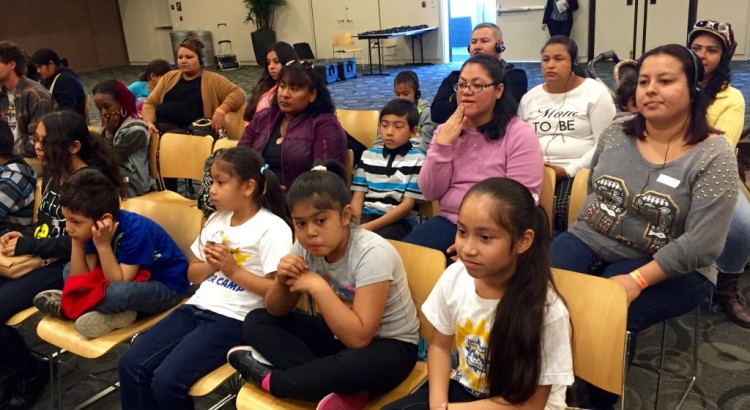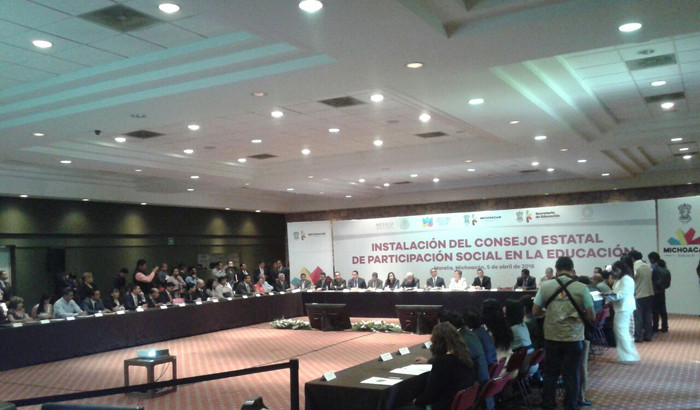Source: “Ayotzinapa. Horas eternas”: un documento desde la voz de las víctimas. Entrevista a Paula Mónaco Felipe
Paula Mónaco Felipe es cordobesa y vive en México desde hace doce años, donde ejerce la profesión de periodista. En estos días se encuentra en Córdoba realizando diversas presentaciones de su primer libro Ayotzinapa. Horas eternas, sobre la desaparición de los 43 estudiantes normalistas mexicanos ocurrida durante los días 26 y 27 de septiembre de 2014 en el estado de  Guerrero. En el programa Enredando las mañanas del 22 de marzo, compartimos su testimonio.
Guerrero. En el programa Enredando las mañanas del 22 de marzo, compartimos su testimonio.
Descargar audio.
Su actividad la llevó a involucrarse primero profesionalmente y luego de manera personal y comprometida, con las familias que buscan a los 43 estudiantes normalistas desaparecidos en Ayotzinapa. Es que su historia la retrotrae a la propia. Paula es además hija de desaparecidos durante la última dictadura. En estos días, cuando recordamos los 40 años del golpe de estado, afirma sin dudar que el círculo con la desaparición de los normalistas no tiene que ver sólo con su historia personal, sino también con la dolorosa seguridad de que “las mismas cosas siguen ocurriendo”.
Luego de presentar su trabajo en la Escuela Superior de Comercio Manuel Belgrano y brindar una profunda descripción del narcoestado mexicano y del contexto en el que se da la desaparición de los estudiantes, conversó con Enredando las Mañanas, acerca de su aproximación al caso, el rol de lxs comunicadorxs y de la solidaridad internacional ante las violaciones de los derechos humanos.
“A Ayotzinapa me acerca mi propia historia y mi humanidad”
Paula viajó en septiembre de 2014 a Guerrero como periodista corresponsal de “El Telégrafo” de Ecuador. Sin embargo, recuerda, “una vez que llego al lugar, me topo enseguida con una situación que me golpea, que me sacude muy fuerte por mi propia historia, de que tengo a mis dos padres desaparecidos acá durante la última dictadura cívico-eclesiástico-militar y por el hecho mismo de estar viendo lo que pasa ahí, que es la impotencia absoluta de familias y de estudiantes ante una situación de una violencia desmedida, la indiferencia de las autoridades, la indolencia de mucha gente hacia el tema”.
“¿Qué me acerca? -se pregunta-, me acerca mi propia historia, y me acerca también el que no puedo ser indiferente a un tema así, yo creo que eso nos puede acercar a muchos, que no hace falta ser periodista, que tiene que ver con una cuestión de postura ante la vida, la humanidad como un componente de nuestra sociedad, tratar de ser cada vez más humanos y cada vez menos indiferentes”.
La escritora mexicana Elena Poniatowska, en el prólogo del libro, describe el momento en que Paula levanta en sus brazos a la bebé de uno de los desaparecidos. Ese hecho, señala Paula, la “toca en lo afectivo, en lo personal, (…) es una historia que creo que es muy fuerte porque resume de alguna forma eso, de cómo me acerca a mí el tema y de cómo, dolorosamente, las mismas cosas siguen ocurriendo. Como lo cuenta Elena en el prólogo, yo en un momento me encuentro cargando en brazos a una bebé que no sé quién es, una bebé muy simpática, muy linda (…) se llama Melani, es la hija de Israel Caballero Sánchez, uno de los desparecidos. Y me doy cuenta que ella tiene, al momento de la desaparición de su papá, casi la misma edad que tenía yo al momento de que desaparecen a los míos en Argentina. Entonces eso de alguna forma cierra un círculo, pero también abre todo otro mundo que es un compromiso, una responsabilidad que yo, como sobreviviente, siento que tengo, que es denunciar estas cosas cuando ocurren, tratar de registrar, de documentar las cosas que son importantes dejar registro”.
“Más que hablar de objetividad, los comunicadores debemos hablar de honestidad y responsabilidad”
Mónaco describe de qué manera el involucrarse con Ayotzinapa implicó para ella una profunda reflexión ética: “yo recuerdo que cuando estudié comunicación social (…) había un debate muy fuerte que atravesaba toda la carrera y que sigue existiendo en los medios, en las escuelas de comunicación, sobre la objetividad. Yo creo que ese debate ya es inútil, trasnochado y está fuera de realidad, que más bien lo que necesitamos son debates, en situaciones como las que vivimos en México, sobre el dolor, el abordaje del dolor, cómo se para el periodista ante la víctima que está entrevistando, cuáles son las formas de enfrentar esa situación, de investigar, de preguntar, pero sin perder la humanidad y de tratar de ponerse en el lugar del otro. Dónde está el límite de qué informar, qué no (…) Yo, por medio de este libro, me replanteé mucho. Nunca fui una defensora de la supuesta objetividad, pero en este libro pensé mucho sobre ese tema. Hago explícito en el libro que es un trabajo sumamente subjetivo porque mi historia condiciona la que yo relato, pero creo que hay otra cosa que es más valiosa que hay que trabajar, y que es la honestidad y la responsabilidad del comunicador. Yo trato de hacerlo, al menos haciéndome las preguntas. No sé si lo logro resolver en el texto, en mi trabajo profesional, pero creo que más que preguntarnos cómo ser objetivos, tenemos que preguntarnos cómo ser honestos y responsables con lo que hacemos como comunicadores”.
Un documento desde la voz de las víctimas
Paula, al presentarlo, describe de qué manera surge la idea y la necesidad del libro, que es solo un momento en el acompañamiento a lxs familiares. El objetivo, explica, es “generar un producto que permita difundir el caso, pero también generar un producto que sea un documento del caso. Un producto que aporte a la documentación de temas que, generalmente, están muy filtrados por las versiones oficiales que, normalmente, silencian o evaden partes, sobre todo las voces de las víctimas. Siempre hay algo simplificado, muchas veces maniqueo, de manipulación de la información. Entonces creo que a todos los demás, a los que componemos la sociedad y no somos el gobierno o los representantes del estado, nos toca trabajar en casos de violaciones graves a los derechos humanos la documentación de lo otro. Entonces –reafirma, por si queda alguna duda-, este libro busca ser un producto que documente qué pasó en Iguala el 26 y 27 de septiembre de 2014 y qué pasó todo el primer año que siguió contado desde la experiencia y las voces y el pensar de las víctimas y sobrevivientes, un aporte al contrarrelato oficial”.
La causa
Paula tiene un profundo conocimiento de la causa judicial y de los vericuetos que se han ido tomando desde la “justicia” para sostener la versión oficial, la llamada “verdad histórica”, desmentida una y otra vez por lxs expertxs de la CIDH y el Equipo Argentino de Antropología Forense. Actualmente, dice “el caso tiene más de cien detenidos, pero no hay ningún condenado. La mayoría están imputados por el delito de secuestro y por delincuencia organizada, que es una especie de comodín que tienen las leyes mexicanas desde hace algunos años. No hay imputaciones por desaparición forzada, y eso también es una alarma porque los delitos como delincuencia organizada y secuestro tienen una fecha de caducidad, son prescriptibles. Pero más allá de eso, y de que no haya nadie condenado, lo más importante es que pese a tener más de 100 personas detenidas, los 43 estudiantes continúan desaparecidos y no se ha enjuiciado ni condenado a los responsables de los asesinatos y de las heridas de gravedad de otros muchachos. Entonces creo que prácticamente podríamos decir que judicialmente y en materia de investigación, la causa está en cero”.
La inacción del estado es todavía más palpable en relación a la búsqueda de los jóvenes, “el estado mexicano asegura que ha realizado búsquedas y que sigue haciéndolo, que no las ha suspendido. Los padres y familiares y compañeros de los normalistas desparecidos refutan eso y dicen que no hay búsquedas y cuestionan que los métodos utilizados no han sido suficientemente efectivos. Yo creo que el solo hecho de que los muchachos continúen desaparecidos y sin pistas de ellos nos da una idea de que al menos la búsqueda ha sido insuficiente, las formas elegidas no han sido las correctas y sabemos que en la desaparición, como en muchos otros delitos, cada minuto que pasa es un minuto que se pierden oportunidades que no pueden volver a repetirse. Entonces el paso del tiempo es un factor que acá no solo abona el olvido, sino que complica cada vez más la posibilidad de encontrarlos con vida”.
“La hipótesis oficial que el estado mexicano sostiene desde el 7 de noviembre de 2014 –continúa-, indica que los jóvenes fueron detenidos por policías en un primer momento, pero que enseguida fueron entregados al narcotráfico y según dice el estado mexicano, el narcotráfico los asesinó, los incineró y desapareció sus restos por completo en un río. O sea, que no sería nada más recuperable que un grupo de bolsas de plástico que el propio estado incautó. Con el paso del tiempo, peritajes independientes de expertos de la talla del Equipo Argentino de Antropología Forense han demostrado que en ese lugar no existió un fuego de la dimensión que dice el estado que hubiera permitido la incineración de los cuerpos y que tampoco los restos encontrados pertenecen a los jóvenes. Es decir, la versión oficial no tiene un sustento real o científico hasta ahora”.
La mirada del mundo
Paula deja en claro que lo ocurrido en Ayotzinapa no fue una excepción. Las ejecuciones y desapariciones se repiten a lo largo y ancho del estado de Guerrero y de otros departamentos del país. Si el caso de Ayotzinapa no hubiera sido captado por la prensa internacional, afirma, hubiera pasado casi en silencio, como muchos otros. “Tres meses antes, en la ciudad de San Pedro Limón en una bodega Tlatlaya fueron ejecutados 22 jóvenes, según se está comprobando fueron ejecutados por integrantes de la secretaría de marina armada. Unos meses después, en Michoacán, en otro estado, policías ejecutaron a civiles que integraban fuerzas ciudadanas de seguridad. Como esos, vamos sumando a cuentagotas algunos, en grupos otros, casos de violencia a niveles indescriptibles y que muchas veces involucran al propio estado y no trascienden más allá de México. A veces, no trascienden siquiera en la prensa nacional. El que Ayotzinapa haya estado en los medios internacionales le da una visibilidad que permite también visibilizar otros problemas que existen, como la desaparición forzada, que en México implica tanto desaparecidos desde los años 70 por razones políticas (cerca de mil personas) y que no se ha condenado a nadie por esos casos, como decenas de miles de personas desaparecidas desde el 2007 a esta parte en el marco de la llamada guerra contra el narco. Entonces Ayotzinapa sigue sin resolverse pero tiene un balance positivo en un punto que es visibilizar y mostrar al mundo una situación en México que los expertos consideran al nivel de crisis humanitaria”.
“Para los familiares es importante ver que hay personas para quienes sus hijos importan”
Además de visibilizar la situación en Guerrero y en México, afirma Mónaco, “el acompañamiento internacional ha sido muy importante también porque da un respaldo a los familiares, los mantiene de pie, les levanta el ánimo. Recuerdo por ejemplo, el primero de noviembre de 2014 los familiares venían de que los recibiera el presidente [Enrique Peña Nieto], casi un mes después de que ocurrieron los hechos. Ellos se sentían primero muy ilusionados por llegar a la máxima esfera posible del país, pero salieron de la reunión desilusionados y muy tristes por no ver ningún cambio. Y llegamos nosotros, yo como integrante de HIJOS, a visitarlos, a tener una charla con ellos, y llevamos impresas y les proyectamos fotografías y videos de otras partes del mundo donde estaban haciendo cosas (…) y ese momento fue increíble, porque muchos de ellos no sabían dónde queda Londres, pero veían a gente en un lugar muy diferente a su realidad, gente físicamente muy diferente, cargando la foto de su hijo. Y veían a personas en la nieve, cargando la foto de su hijo. A otros cantando en un concierto… y eso los revivió de alguna forma. Eso ha sido también el alimento, como la gente les manifiesta solidaridad en México, el salir a otros países y ver no sólo que los acompañan a ellos, sino que hay personas para quienes sus hijos importan. Entonces creo que el acompañamiento internacional es muy importante y que ojalá se pueda seguir de alguna forma junto a ellos. De la forma que se pueda, cada quien como pueda”.
http://www.rnma.org.ar/noticias/19-internacionales/2993-ayotzinapa-horas-eternas-un-documento-desde-la-voz-de-las-victimas-entrevista-a-paula-monaco-felipe

















 Users Today : 35
Users Today : 35 Total Users : 35460298
Total Users : 35460298 Views Today : 49
Views Today : 49 Total views : 3419017
Total views : 3419017